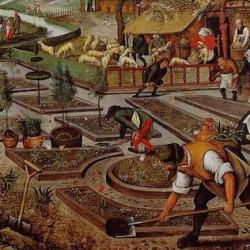Human labor is an imitation of and participation in the creative work of God, and fulfilling human labor has the same structure as God’s creative work. We take hold of the world, tear it apart, reassemble it, give it a new name, and then evaluate the products of our labor (as James Jordan has pointed out). Fulfilling labor has its telos in Sabbath.
“Sabbath” here not only means “ceasing” but “enjoyment.” At the end of the creation week, God saw that it was all “very good” and rested in the satisfaction of a job well done. When human labor falls short of Sabbath, it produces frustration and alienation rather than fulfillment. A worker on an assembly line who spends a lifetime performing one tiny task over and over again has a more limited experience of Sabbatical satisfaction than the craftsman who sees a project through from start to finish.
Of course, large-scale production requires masses of workers doing relatively small tasks; a single craftsman cannot product a Boeing 777. But assembly-line work can be fulfilling if the workers are aware that they are part of a larger project. Being a member of a production team , like being a cast member in a play, can be highly rewarding, and even the most repetitive work can bring satisfaction in that context. The problem is that many larger corporations fail to give employees any sense of being part of a larger whole, and this is especially true when the employee’s employment is precarious. How is a worker supposed to experience the social satisfactions of labor when he’s never sure if he’ll be part of the team for the next project? It is like being in Egypt; it is like bricks without straw, labor without Sabbath.










